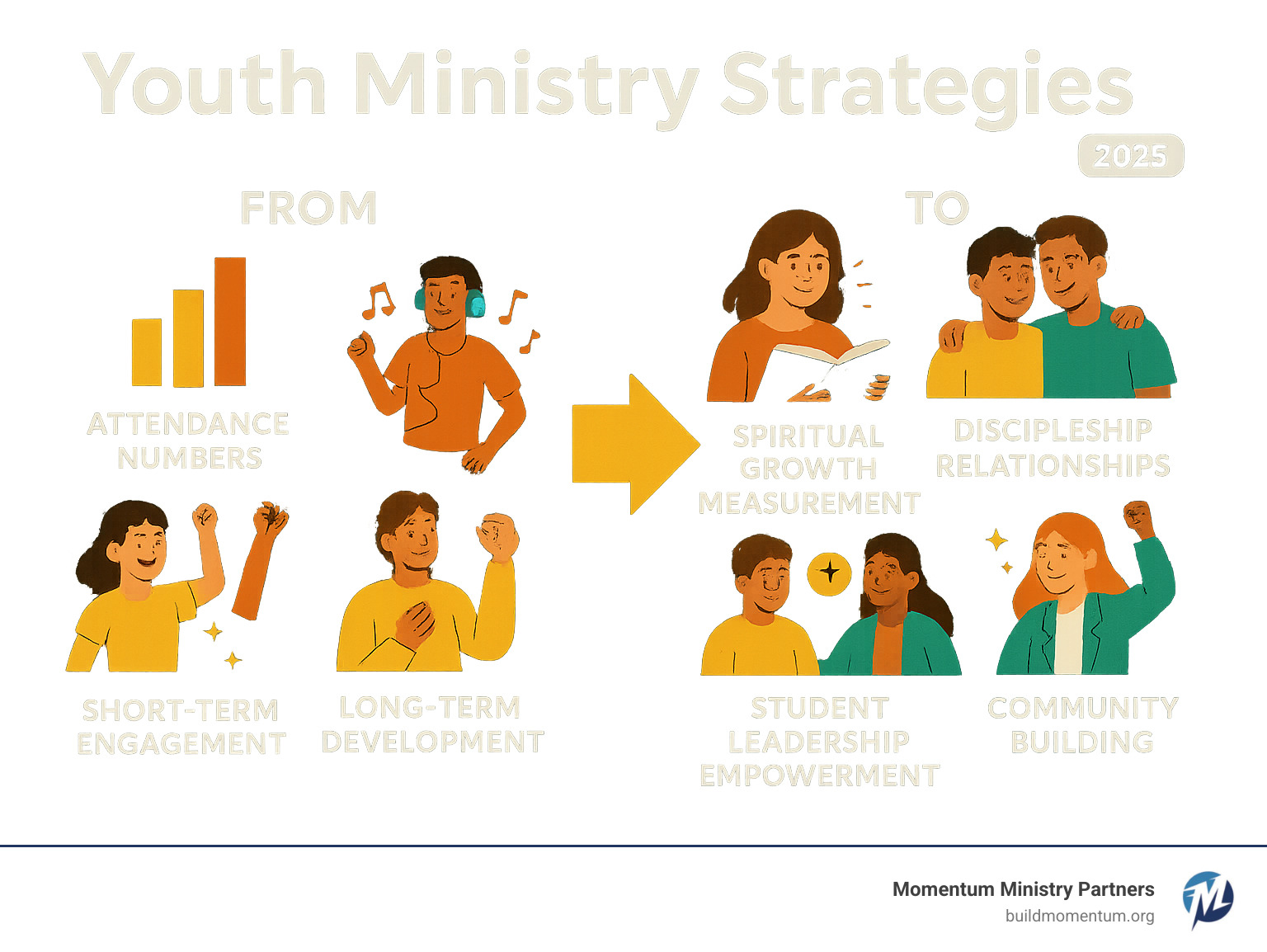Why Youth Ministry Success Requires a Strategic Mindset Shift
Effective youth ministry strategies go far beyond pizza parties and dodgeball. If your ministry feels stuck—with declining attendance and disengaged students—you’re not alone. The problem isn’t that today’s youth are harder to reach; it’s that many ministries use outdated approaches that treat teens as consumers instead of disciples.
The most effective youth ministry strategies focus on:
- Discipleship over entertainment – Moving from shallow activities to deep spiritual formation.
- Relationships over programs – Prioritizing genuine connections with students.
- Long-term faith over short-term excitement – Measuring success by lifelong spiritual growth.
- Student empowerment over passive consumption – Giving youth real leadership opportunities.
- Community building over individual events – Creating a sense of belonging and accountability.
Students are hungry for substance. One youth ministry saw 396% growth in six months by focusing on expository preaching and live Q&A sessions. This guide will help you build a thriving, disciple-making youth ministry with proven strategies for lasting spiritual impact.
I’m Jeff Bogue, President of Momentum Ministry Partners. With over three decades in ministry leadership, I’ve seen what works in building sustainable, life-changing youth programs. Let me show you how to transform your ministry from “meh” to truly meaningful.

The Foundation: Shifting Your Mindset and Redefining Success
Here’s a hard truth: many youth ministries measure success all wrong. We chase attendance numbers, celebrating packed rooms while missing the real question—are we making disciples? If your ministry is stuck in a cycle of entertainment without seeing lasting spiritual growth, it’s time for a fundamental mindset shift. Effective youth ministry strategies focus on filling hearts with a faith that lasts long after graduation.
Redefining success means moving from short-term excitement to long-term spiritual maturity. Instead of asking, “How many kids showed up?” we need to ask, “How many are becoming lifelong followers of Jesus?” This shift changes everything. Your purpose, vision, and mission must align with this deeper goal. Youth ministry exists to serve the two institutions God designed for discipleship: the family and the church. We’re building a bridge that connects young people to their spiritual heritage, not running an isolated entertainment center.
This perspective helps us avoid common pitfalls and focus on cultivating lifelong faith. Ready to make this change? Check out The Future of Youth Ministry Starts Here and find Healthy Youth Ministry Habits to Start the New Year to begin.
From Numbers to Disciples: Measuring What Truly Matters
Counting heads feels good, but true success in youth ministry often can’t be measured until years after students graduate. The real question isn’t “How many showed up?” but “How many are still walking with Jesus?” This means we must look beyond attendance and focus on indicators of lifelong faith.
What does this look like practically? We should measure engagement, looking for students who are developing spiritual practices like regular Scripture reading and prayer. We’re watching for young people building meaningful relationships with mature believers and celebrating teenagers who are actively engaged in service. These metrics point toward a faith that survives college, career changes, and life’s challenges.
To dive deeper, explore The Basics of Spiritual Growth in Students and find 3 Essentials to Effective Student Discipleship to start measuring what truly matters.
Overcoming Growth-Hindering Pitfalls
Many declining youth ministries are stuck because of internal mindsets and outdated practices. Let’s tackle these growth-hindering pitfalls head-on.
- The entertainment trap: We’ve bought the lie that spiritual growth needs to be sugar-coated. But students are hungry for truth, not just more fun. When every week is a carnival, we send the message that faith isn’t challenging or meaningful.
- Begging for friends: Desperately pleading with kids to invite friends lowers the perceived value of your ministry. Instead, create a community worthy of an invitation. Empower them by asking, “Do you know anyone who would benefit from being part of this community?”
- Babying teens: Shielding teenagers from spiritual challenges is harmful. Some students leave because standards are too high, but many more leave because they’re not high enough.
- The complaining mindset: It’s easy to focus on what your youth group “is not.” Instead, celebrate your ministry for what it is and the progress students are making.
These pitfalls keep ministries stuck in program-centric approaches. To break free, check out 3 Disturbing Cultural Trends Youth Pastors Need to Address and learn How Churches Can Keep Youth Engaged.

Building Your Strategic Framework: Purpose, Vision, and Mission
Every thriving youth ministry needs a clear strategic framework. Without it, you’re just reacting to the next crisis. Your framework starts with answering three fundamental questions.
- Purpose answers “Why do we exist?” Your youth ministry exists to serve the church and serve the family. You’re not running an independent kingdom; you’re building a bridge that supports parents and integrates youth into the broader church body.
- Vision creates your “postcard from the future.” What do you want your ministry to look like in 5-10 years? Your vision should inspire you and your students with a picture of spiritually healthy young adults engaged in God’s Kingdom.
- Mission becomes your compass. This actionable statement defines how you’ll achieve your vision, keeping you focused and helping you recruit leaders who share your direction.
This framework represents a long-term investment mindset. Real change happens over years, not overnight. Dive into Reaching the Younger Generation to see how your strategy fits into God’s bigger picture.
Core Youth Ministry Strategies for Deep Spiritual Growth
Students are hungry for truth, not just shallow entertainment. When one youth ministry shifted from games-focused programming to expository preaching, sound doctrine in music, and live Q&A sessions, they saw an incredible 396% growth in just six months. This proves that young people respond when we offer substance.
The most effective youth ministry strategies prioritize discipleship models that create genuine spiritual formation. This doesn’t mean eliminating funit means ensuring our fun has a purpose and our programs create lasting impact. We want students to leave each week feeling they learned something that truly matters for their lives.
Models for Effective Student Discipleship
There’s no one-size-fits-all approach to discipling young people. Using multiple models helps you reach more hearts and minds.
- Traditional youth group settings are effective when teenagers are involved as leaders, not just consumers. Let them organize sessions, lead worship, and even teach. Engagement skyrockets when they become active participants.
- Small groups offer intimate space for real conversation and honest questions. With trained adult leaders, these groups become powerful environments for wrestling with faith together.
- Mentoring relationships create crucial intergenerational connections. One-on-one investment from a mature Christian makes discipleship deeply personal and impactful.
- Home groups integrate youth into broader church life, showing them what authentic Christian community looks like beyond their teenage years and preparing them for their own discipleship journey.
Each model helps young people grow in their faith. See the impact by reading 3 Reasons High School Students Should Mentor Middle School Students.

Designing Engaging and Spiritually Formative Environments
Creating transformative environments requires an intentional balance of fun and purpose. Every element of your youth ministry should contribute to spiritual growth.
- Games and activities have their place, but they shouldn’t be the main attraction. Today’s students often prefer collaboration over competition. Try skill-based activities where students learn something practical while discussing faith, like a photography lesson on seeing God’s beauty.
- Getting outside the youth room can revolutionize your ministry. Take students on hikes, serve at local nonprofits, and debrief about living out the Gospel in the real world. Find creative ideas in Play with Purpose.
- Expository preaching means starting with a Scripture passage and unpacking what it means. Students crave this solid teaching and want to understand how God’s Word applies to their lives.
- Worship music teaches theology, so prioritize songs with sound doctrine. The goal is genuine worship, not a performance.
- Live, anonymous Q&A sessions create a safe space for doubt. Use simple tech to let students ask hard questions, then provide honest, biblical answers. This builds tremendous trust.
For practical guidance, check out Simple Teaching Tips Every Youth Leader Needs, learn to handle Uncensored: Handling Difficult Topics in Youth Group, and explore Unlocking Honest Conversations: The Role of Q&A Sessions in Youth Ministry.
Building Your Team: Empowering Volunteers, Parents, and Student Leaders
No youth ministry thrives on the shoulders of just one person. The most impactful youth ministry strategies involve a strong team of dedicated volunteers, engaged parents, and empowered student leaders. When you stop trying to do everything yourself and start investing in others, you multiply your ministry’s potential.
When you multiply yourself through volunteers, partner with parents, and raise up student leaders, you create an army of people invested in seeing young lives transformed. Start by exploring Unlocking Team Potential: The Power of Youth Leaders and find practical approaches in How to Engage Parents in Your Student Ministry.
Effective Youth Ministry Strategies for Volunteer Engagement
Your volunteers are the backbone of your ministry. Recruiting warm bodies doesn’t work; you need the right people, and you must invest in their growth.
- Recruit relational people who genuinely enjoy being around teenagers. A heart for students can’t be manufactured.
- Ongoing training is essential. Your team needs regular training in discussion skills, active listening, and child protection guidelines, as well as theological grounding to handle deep questions.
- Preventing burnout is a top priority. Create sustainable rhythms by defining roles, rotating responsibilities, and consistently showing appreciation. Burned-out volunteers can’t pour into others effectively.
At Momentum Ministry Partners, we offer comprehensive training to empower your volunteers. Also, learn 5 Simple Ways Youth Leaders Can Connect with Parents to strengthen these vital partnerships.
Partnering with Parents for Lasting Faith
Parental influence remains the primary factor in the religious commitment of youth. This isn’t a threat—it’s your greatest opportunity. Your role is to partner with parents, not replace them.
- Equip parents by providing practical resources and opportunities for them to grow in their own faith. Offer parent-specific study groups or family devotionals that connect to your teaching.
- Communicate strategically. Keep parents informed, but also create opportunities for genuine dialogue through meetings, coffee chats, or simple text updates to build trust.
- Support the whole family. When parents feel supported in all areas of life, they’re more likely to trust you with their child. Research shows that students thrive when they have multiple caring Christian adults investing in them, and you can help build that network.
This approach is crucial when addressing sensitive topics like Christian Mental Health: Walking Alongside Youth.

Raising Up the Next Generation: A Guide to Student Leadership
A changeal strategy is viewing young people as participants in ministry, not just objects of it. When you empower students to lead, their faith deepens and your ministry’s impact multiplies.
- Identify potential leaders by looking for initiative, not just enthusiasm. The quiet student who helps clean up may be a future leader.
- Create structured training programs to equip students with practical skills and a servant’s heart. We can guide you through Starting a Student Leadership Team and Step-by-Step: Creating a Student Leader Training Program.
- Give real responsibility. Let students lead worship, facilitate small groups, and organize service projects. Meaningful roles develop genuine ownership.
- Provide mentorship by pairing each student leader with an adult who can guide and encourage them.
You’re not just strengthening your current ministry—you’re investing in the future of the church. Dive deeper with From Followers to Leaders: Fostering Young Christian Leadership and 3 Things You Must Do to Raise Up Student Leaders.
Putting Faith into Action: Community, Mission, and Outreach
A vibrant youth ministry spills out into the world, building community, engaging in mission, and reaching out to others. A simple summer kickoff with a mega-waterballoon fight can be incredibly welcoming—one such event saw 10% of its attendees as first-timers, showing the impact of inclusive events.
We believe in Putting Faith into Action: What it Means for Your Youth Group. We’re here to offer insights into Three Ways to Make Youth Group a Thriving Community.
Cultivating a Thick Community of Belonging
Youth ministry is about creating a place where young people truly belong. Our goal is to cultivate a “thick community”—a safe space for belonging and accountability, where every person feels valued.
This means actively combating cliquishness and fostering inclusiveness and acceptance. We prioritize relational activities like retreats and lock-ins that forge deep bonds. You don’t need a huge budget to create meaningful experiences. We also encourage a culture where students lovingly hold one another accountable in their faith journeys. By fostering this strong sense of belonging, we empower young people to move From Consumers to Contributors: Empowering Youth in Worship.
Practical Youth Ministry Strategies for Outreach and Mission
Our aim is to equip young people for patient mission, helping them see their schools, teams, and homes as mission fields. These youth ministry strategies empower students to share their faith and serve the world.
- Relational evangelism: Teach students to share their faith authentically, without pressure.
- Service learning: Integrate service projects and mission trips that let students put their faith into action, whether locally or further afield.
- Creative outreach events: A fun, low-cost event like a waterballoon fight can successfully draw in new students.
- Equipping students to share their faith: Instead of just saying “bring your friends,” reframe the invitation: “Do you know anyone who would benefit from being a part of this community?” This empowers them to be led by the Spirit.
Explore 5 Challenges That Keep Students From Sharing Their Faith and consider Why Take Your Youth Group to Youth Conference? to further equip them for mission.

Ensuring Long-Term Health and Adaptability
Ministry is a marathon, not a sprint. Too many youth leaders burn out because the landscape of youth culture is constantly shifting. To build something that lasts, we must prioritize our own well-being while staying adaptable.
The question of How is Generation Z Changing Youth Ministry? is reshaping our approach. We’re in a Student Ministry: A New Normal where the old playbook doesn’t always apply. The good news is that ministries that accept both leader health and cultural adaptability don’t just survive—they thrive.
Our experience, including a youth ministry podcast with over 400 shows, has taught us that sustainability comes from personal growth and ministry flexibility. Let us help you use your Youth Ministry Radar: Navigating Youth Group Topics while maintaining your own health.
Preventing Burnout and Pursuing Personal Growth
You can’t give what you don’t have. Personal growth and burnout prevention are essential for effective ministry.
- Establish sustainable rhythms and soul care. Set clear boundaries between work and rest, and prioritize your personal relationship with God.
- Find a coach and mentor. Our programs are designed to help leaders like you grow stronger and more effective.
- Pursue continuing education. Our youth ministry podcasts offer ongoing learning from experienced leaders.
- Build a support network. Connect with other youth leaders to share challenges, celebrate wins, and find encouragement.
Adapting to an Evolving Youth Culture
Today’s teenagers (Gen Z and the emerging Gen Alpha) value authenticity over entertainment and purpose over programs. This is an opportunity to accept.
- Understand their values. These young people are digitally native, socially conscious, and hungry for genuine connection.
- Address mental health. Create safe spaces for students to discuss their struggles without judgment. Train leaders to recognize warning signs and know when to refer students to professional help.
- Leverage technology and social media to build community and extend your ministry beyond Sunday nights.
- Use AI tools for brainstorming. Artificial Intelligence can be a valuable assistant for generating ideas, adapting content, and sparking discussions. It’s a tool to improve your ministry, not replace your pastoral wisdom.
Stay curious about your students’ world while remaining anchored in biblical truth. Explore our Resources for Actually Reaching the Next Generation to bridge the gap between eternal truth and contemporary culture.
Frequently Asked Questions about Youth Ministry Strategies
As you implement new youth ministry strategies, questions will arise. Here are answers to the most common ones.
How do you make youth ministry more engaging?
The secret isn’t more games; it’s giving students real ownership and purpose. When young people feel like contributors rather than consumers, everything changes.
- Involve students: Let teenagers lead worship, plan activities, and even teach. Their engagement will soar when they have skin in the game.
- Focus on relationships: Students need adults who genuinely care about their lives. Prioritize building meaningful connections over managing events.
- Offer purposeful fun: Move beyond traditional games to include skill-based activities that connect to faith conversations, like hiking while discussing faith as a journey.
- Apply faith to the real world: Address the actual struggles your students face. When they see how Scripture speaks to their Monday morning problems, they’ll be engaged.
- Create open dialogue: Use anonymous Q&A sessions to create safe spaces for honest questions about faith and life.
What is the main goal of a youth ministry?
The main goal is not entertainment or babysitting. It is to help teenagers become lifelong followers of Jesus.
This means focusing on deep spiritual formation—cultivating character, teaching sound doctrine, and encouraging spiritual practices that will sustain them for a lifetime. It also involves integrating youth into the church body so they see themselves as vital members of the wider church family. Finally, it’s about equipping them for life and service so they are prepared to live out their faith and make disciples in the real world. The true measure of success is whether they are still walking with Jesus years from now.
How do you attract new youth to your ministry?
Stop begging students to “bring a friend.” This lowers the perceived value of your ministry. Instead, focus on creating a welcoming culture that’s genuinely worth inviting people into.
- Empower students to invite: Reframe the ask to, \”Do you know anyone who would benefit from being a part of this community?\” This focuses on serving others, not just boosting numbers.
- Be genuinely inclusive: Before you can attract newcomers, your existing group must be a welcoming place that actively combats cliques.
- Host high-impact outreach events: Plan exciting, well-publicized events that are easy for new students to attend. A simple event can be highly effective.
- Engage with parents: Parental influence is a key factor in a teen’s religious commitment. Connecting with parents and involving them in the church community is a powerful attraction strategy.
Conclusion: Building a Ministry with Momentum
Changing your youth ministry from “meh” to meaningful is achievable when you commit to proven youth ministry strategies and the mindset shifts we’ve explored. You now have a roadmap that prioritizes lifelong discipleship over attendance, authentic community over flashy programs, and student empowerment over passive consumption.
The journey requires courage. The 396% growth we mentioned happened because leaders chose substance over shallow entertainment. Building your strategic framework, empowering your team of volunteers, parents, and students, and putting faith into action will multiply your impact.
This is a marathon, not a sprint. Change happens over time. Some weeks will feel like victories, others like setbacks. But when you stay focused on the ultimate goal—seeing young people become lifelong followers of Jesus—every step matters.
At Momentum Ministry Partners, we believe in the power of partnership. You don’t have to figure this out alone. We’re committed to walking alongside local churches, providing the resources, training, and encouragement you need to build ministries with lasting momentum.
Your ministry has incredible potential. The young people in your care are hungry for truth and authentic relationships. By implementing these strategies, you’re not just changing a program—you’re changing lives for eternity.
Ready to take the next step? Explore resources for your youth ministry and find how we can partner together. The momentum starts now.







0 Comments